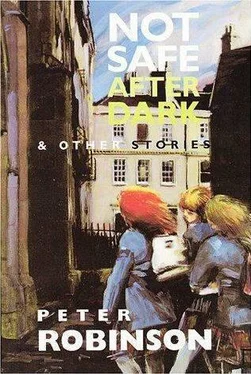In the morning, he awoke aching all over.
When he had showered, taken more Tylenol and forced himself to eat some bran flakes, he poured a second cup of strong black coffee and sat down to think things out. None of his thoughts brought any comfort.
He hadn’t gone to the cops. How could he, given what he had been carrying? Whichever way you looked at it, he had been in possession of an illegal, unregistered firearm when he was mugged. Even if the cops had been lenient, there was the Law Society to reckon with, and like most lawyers, Mitch feared the Law Society far more than he feared the police.
Maybe he could have sort of skipped over the gun in his account of the mugging. After all, he was pretty sure that it couldn’t be traced either to him or to Garibaldi. But what if the cops found the briefcase and the gun was still inside it? How could he explain that?
Would that be worse than if the briefcase turned up and the gun was gone? If the muggers took it, the chances were someone might get shot with it. Either way, it was a bad scenario for Mitch, and it was all his fault. Well, maybe fault was too strong a word – he couldn’t help getting mugged – but he still felt somehow responsible.
All he could do was hope that whoever took the gun would get rid of it, throw it in the lake, before anyone came to any harm.
Some hope.
•
Later that morning, Mitch remembered Garibaldi’s will. That had gone, too, along with the briefcase and the gun. And it would have to be replaced.
There’s only one true will – copies have no legal standing – and if you lose it you could have a hell of a mess on your hands. Luckily, he had Garibaldi’s will on his computer. All he had to do was print it out again and hope to hell the old guy hadn’t died during the night.
He hadn’t. Puzzled, but accepting Mitch’s excuse of a minor error he’d come across when proof-reading the document, Garibaldi signed again with a shaking hand.
‘Is the gun safe?’ he asked afterwards. ‘You’ve got it locked away in your safe?’
‘Yes,’ Mitch lied. ‘Yes, don’t worry, the gun’s perfectly safe.’
•
Every day Mitch scanned the paper from cover to cover for news of a shooting or a gun found abandoned somewhere. He even took to buying the Sun – which he normally wouldn’t even use as toilet paper up at the cottage – because it covered more lurid local crime than the Globe or the Star . Anything to do with firearms was certain to make it into the Sun .
But it wasn’t until three weeks and three days after the mugging – and two weeks after Mr Garibaldi’s death ‘peacefully, at home’ – that the item appeared. And it was big enough news to make the Globe and Mail .
Mr Charles McVie was shot dead in his home last night during the course of an apparent burglary. A police spokesperson says Mr McVie was shot twice, once in the chest and once in the groin, while interrupting a burglar at his Beaches mansion shortly after midnight last night. He died of his wounds three hours later at East General Hospital. Detective Greg Hollins, who has been assigned the case, declined to comment on whether the police are following any significant leads at the moment, but he did inform our reporter that preliminary tests indicate the bullet was most likely fired from an old 9mm semi-automatic weapon, such as a Luger, unusual and fairly rare these days. As yet, police have not been able to locate the gun. Mr McVie, 62, made his fortune in the construction business. His wife, Laura, who was staying overnight with friends in Windsor when the shooting occurred, had no comment when she was reached early this morning.
The newspaper shook in Mitch’s hands. It had happened. Somebody had died because of him. But while he felt guilt, he also felt fear. Was there really no way the police could tie the gun to him or Mr Garibaldi? Thank God the old man was dead, or he might hear about the shooting and his conscience might oblige him to come forward. Luckily, his widow, Sophie, knew nothing.
With luck, the Luger was in the deepest part of the lake for sure by now. Whether anyone else had touched it or not, Mitch knew damn well that he had, and that his greasy fingerprints weren’t only all over the grip and the barrel, but on the wrapping paper, too. The muggers had probably been wearing gloves when they robbed him – it was a cold night – and maybe they’d had the sense to keep them on when they saw what was in the briefcase.
Calm down, he told himself. Even if the cops did find his fingerprints on the gun, they had no way of knowing whose prints they were. Mitch had never been fingerprinted in his life, and the cops would have no reason to subject him to it now.
And they couldn’t connect Charles McVie to either Mr Garibaldi or to Mitch.
Except for one thing.
Mitch had drawn up McVie’s will two years ago, after his marriage to Laura, his second wife.
•
Mitch had known that Laura McVie was younger than her husband, but even that knowledge hadn’t prepared him for the woman who opened the door to him three days after Charles McVie’s funeral.
Black became her. Really became her, the way it set off her creamy complexion, long blonde hair, Kim Basinger lips and eyes the colour of a bluejay’s wing.
‘Yes?’ she said, frowning slightly.
Mitch had put on his very best, most expensive suit, and he knew he looked sharp. He didn’t want her to think he was some ambulance-chaser come after her husband’s money.
As executor, Laura McVie was under no obligation to use the same lawyer who had prepared her husband’s will to handle his estate. Laura might have a lawyer of her own in mind. But Mitch did have the will, so there was every chance that if he presented himself well she would choose him to handle the estate too.
And there was much more money in estates – especially those as big as McVie’s – than there was in wills.
At least, Mitch thought, he wasn’t so hypocritical as to deny that he had mixed motives for visiting the widow. Didn’t everyone have mixed motives? He felt partly responsible for McVie’s death, of course, and a part of him genuinely wanted to offer the widow help.
After Mitch had introduced himself, Laura looked him over, plump lower lip fetchingly nipped between two sharp, white teeth, then she flashed him a smile and said, ‘Please come in, Mr Mitchell. I was wondering what to do about all that stuff. I really could use some help.’ Her voice was husky and low-pitched, with just a subtle hint of that submissive tone that can drive certain men wild.
Mitch followed her into the high-ceilinged hallway, watching the way her hips swayed under the mourning dress.
He was in. All right! He almost executed a little jig on the parquet floor.
•
The house was an enormous heap of stone overlooking the ravine. It had always reminded Mitch of an English vicarage, or what he assumed an English vicarage looked like from watching PBS. Inside, though, it was bright and spacious and filled with modern furniture – not an anti-macassar in sight. The paintings that hung on the white walls were all contemporary abstracts and geometric designs, no doubt originals and worth a small fortune in themselves. The stereo equipment was state-of-the-art, as were the large screen TV, VCR and DVD player.
Laura McVie sat on a white sofa and crossed her legs. The dress she wore was rather short for mourning, Mitch thought, though he wasn’t likely to complain about the four or five inches of smooth thigh it revealed. Especially as the lower part was sheathed in black silk stockings and the upper was bare and white.
Читать дальше










![Джеймс Чейз - Not Safe to Be Free [= The Case of the Strangled Starlet]](/books/417649/dzhejms-chejz-not-safe-to-be-free-the-case-of-the-thumb.webp)

